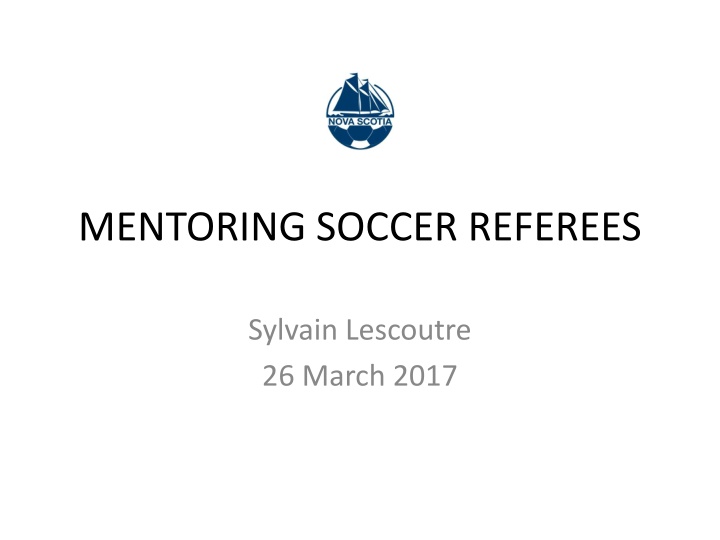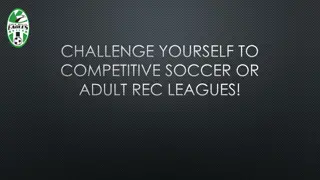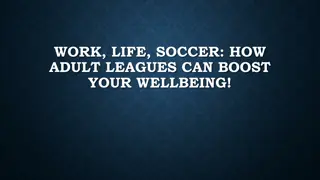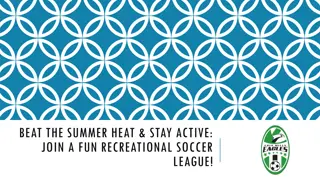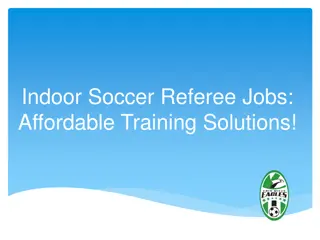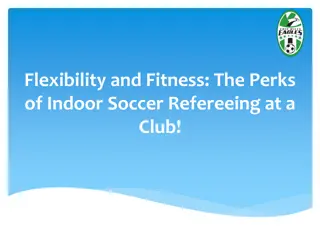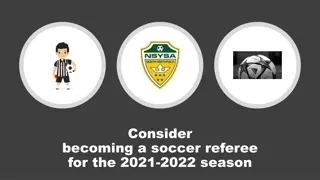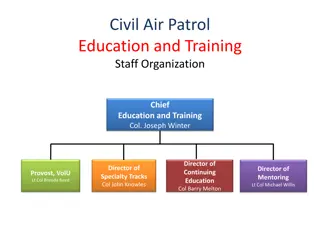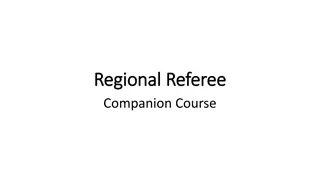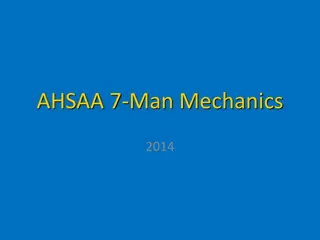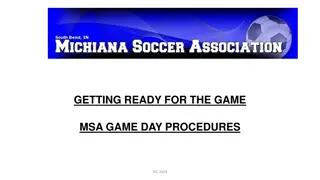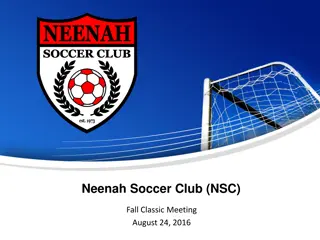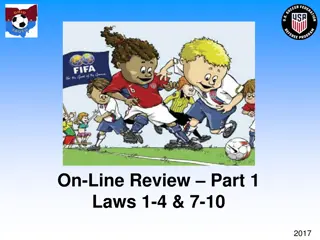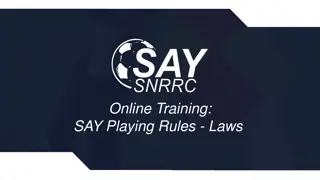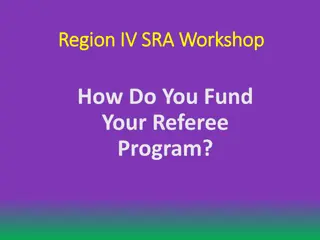Mentoring Soccer Referees: Key Program Elements and Opportunities
The mentoring program for soccer referees in Nova Scotia plays a vital role in developing new officials and providing pathways for mentorship to assessment and accelerated promotion. Mentoring opportunities exist at all levels of play and focus on improving skills and knowledge through feedback and guidance, ultimately shaping better referees. Mentors are expected to exhibit specific characteristics and adhere to defined mentoring levels based on referee progression. Understanding the development levels and referee classifications is crucial for effective mentorship in soccer officiating.
Download Presentation

Please find below an Image/Link to download the presentation.
The content on the website is provided AS IS for your information and personal use only. It may not be sold, licensed, or shared on other websites without obtaining consent from the author.If you encounter any issues during the download, it is possible that the publisher has removed the file from their server.
You are allowed to download the files provided on this website for personal or commercial use, subject to the condition that they are used lawfully. All files are the property of their respective owners.
The content on the website is provided AS IS for your information and personal use only. It may not be sold, licensed, or shared on other websites without obtaining consent from the author.
E N D
Presentation Transcript
MENTORING SOCCER REFEREES Sylvain Lescoutre 26 March 2017
Aim of Mentoring Program Important Element in the Development of Soccer Referees in Nova Scotia Helps develop the new Referee in becoming a better official Provides a pathway for Mentors to become Assessors Provides a mean to identify Referees who demonstrated the abilities for accelerated promotion
What is Mentoring It is a Professional Relationship in which a more experienced person (Mentor) voluntarily shares knowledge, insights, and wisdom with a less experienced person (Mentee) who wishes to benefit from that exchange.
Characteristics of a Mentor Has a sound knowledge of the LOTG Has refereeing experience Is a good role model and acts as a person with integrity Has good judgment & decision making Is a good listener, encourages and assists in developing self- awareness Is observant and has good analytical skills Has good communication skills and always display a positive attitude Is a responsible person
Mentoring Opportunities Mentoring may be done on any game and at any level of play Ensure that new Entry Level Referees are mentored in one of their early games You do not have to be assigned officially to mentor new officials remember, they will replace you one day Mentoring may take the form of verbal and/or written feedback, during and/or after the game
Mentoring Defined District Referees at Entry Level 0 to Level 3 These are the levels a referee may progress from mentoring report with positive recommendations Responsibility of the Regional Mentoring Coordinator Beyond Level 4, an assessment is needed for upgrading purposes
DEVELOPMENT LEVELS Development Level I II III IV V Development Type Entry Level Basic Level Intermediate Level Advance Level National Level Referee Classification 0 1 2 3 4 5 6 7 8 9 10 National/FIFA Development Coordinator1 Region - VP Development Chief Assessor & Provincial Assessment Committee CSA Region Dev Coord 2 (With RDO & C Ass.) Referee Committee Region Dev Coord 1 Promotion Requirement Auto2 Assessment3 Training & Assessment3 Training & Assessment3 Mentoring Beginning - ?? 1 End - ?? Promotions - ?? 1. For Each development level, there is a development coordinator. The main task of the development coordinator is to identify, at each stage of development, the referee(s) that are likely to progress at the next and subsequent levels. Once the referee(s) have been identified, they are to be given opportunities for training and development. 2. Entry Level Referees could still be mentored if he/she has demonstrated excellent abilities for accelerated promotion. 3. For Classification Levels 7 and above, the Referee must also pass a fitness test. Notes
Mentoring Process Regional Mentoring Coordinator will manage and appoint mentors to games RMC will work with local assignors, and where possible use SNS Goalline Assignment system Mentor will watch all three officials from the side of the pitch, or may be one of the official of the game RMC must ensure consistency of any recommendations for designation changes
Mentoring Before the Game Arrive at the field before the time prescribed Introduce yourself to the team of officials and advise them that you have been assigned as a mentor Listen to pre-game instructions and provide feedback as applicable Encourage and answer questions
Mentoring Half Time Have a quick discussion with the team of officials Stress the positive with each of them! What has each official done well Choose one or two points of focus for the second half
Mentoring After the Game Ensure that all game details are completed properly Provide positive verbal feedback on areas of strength and areas for development Follow up on issues covered at half time Encourage questions from the officials Help the officials understand the Referee Development Process Feedback should not last more than 15 minutes
Mentoring - Reporting Write a Mentoring Report (Goalline or Word) covering the points discussed under strength and areas for development No additions to post game discussions Make recommendation for a change in designation, or indicate a review period Send the report to the SNS Referee Development Officer within 72 hours
Mentoring - Reviewing The RDO reads and comments on the report as appropriate The RDO will send the report to the mentee and to the Regional Mentoring Coordinator, as needed Upgrading recommendation made in the report is recorded by the RDO and actioned by the Regional Committee
Mentoring Core Competencies Core Competencies are the skills and aptitudes that the official requires to be promoted to the next level
Mentoring Core Competencies Assistant Referee Development Level I Entry Level Level 0 1. Arrive on time and acceptable uniform 2. Correct Flag Signal 3. Correct Positioning - 2LD/GK/CK/PK 4. Fitness & Alertness Promotion 4 Games as AR Referee 1. Arrive on time and acceptable uniform 2. Good pre-game instructions 3. Knows the Laws of The Game 4. Correct hand signals 5. Correct Positioning 6. Fitness and Alertness Level 1 Promotion 6 Games as Ref Assistant Referee Development Level II Basic Level Level 2 1. As per Above 2. Eye contact with Ref & mirror appropriately 3. Use Voice when appropriate 4. Assist Ref in Foul Recognition 5. Show Full Confidence Promotion Mentor Report (16 YO) Referee 1. As per Above 2. Thorough Pre-game instructions 3. Use Variation in the whistle 4. Communicate with players as appropriate 5. Recognize Fouls and penalize correctly 6. Eye Contact with ARs 7. Show Full Confidence Level 3 Promotion Two Mentor Reports
Automatic Upgrading Scheme Tool which the RMC can use during the Summer or at the end of the Season Allows the new officials to move through the system in the early ranks (Levels 0 & 1), while the Region puts more mentoring resources for the higher Level 2 & 3 Officials Use at the end of the season to retain as many officials Lessen the burden of re-training year after year a new group of officials RDC must still submit recommendations to the RDO
Mentor Evaluation Name of Referee: John Doe (Lev 1) CR:__XX Game Date: 24 Jul 16 Strengths: You arrived to the game well prepared, and you gave good pre-game instructions to your assistants. Throughout the game, your hand signals were well executed and you used good variations in your whistle. You know the laws of the game as you checked the pressure of the balls before the game, and you called a few foul throws. Although there was only one foul during the game at Min 65, you recognized it. Your positioning from ball out of play (KO, GK, CK, FK) was good, and you ran a good diagonal system during active play. You were alert throughout the match, and you showed good confidence. Areas for development: When there is an attack or counter-attack, I would like you to start your run earlier and get closer to active play, especially in the area of the field away from your lead AR: much better in the second half. Some eye contact with your ARs, but try to look at them (AR1 especially) at most stoppage of play. Recommendation: John, a very good performance on Sunday. I am recommending you for promotion to Level 2. Well done!
Mentoring Word Pictures - AR Preamble: The aim of these Word Pictures is to assist the mentor in the preparation of the report, and examples are provided for "Areas for Development" and "Areas of Strength" tied directly to the Core Competencies for Entry and Basic level referees (Lev 0-3). An official can still receive a recommendation for promotion with an area for development: mentors are to use judgment and common sense when making such recommendation. L Core Competencies 1. TIMING & UNIFORM Consider: time arrived before KO, suitability of uniform. 2. FLAG SIGNALS Consider: accuracy of signals for TI/GK/CK/Offside, holds flag in correct hand. Areas for Development --Do not forget to be at the field at least 15 mins before KO. Areas of Strength - -You arrived in plenty of time for the game and your uniform was correct. AR L E V E L 0 & 1 - -When indicating a flag signal, hold your signal for two seconds. -- Once the second half started, you were slightly confused as to which team was going in which direction: take a moment before each half to assess the teams' directions. - -When indicating a goal kick or corner kick signal, you should run to the corner flag, stop, and signal. -- When reaching the penalty area, you should side step while facing the field. - -You have a tendency to watch play instead of your second last defender (2LD). You should concentrate your sight on the 2LD with an occasional glance on active play. -- When a goal is scored, make eye contact with the referee and when confirmed, run quickly 20- 25 yards along the touch line toward the halfway line. - -Your flag signals were mechanically correct. --Your flag signals were very accurate and timely. -- For the better part of the game, you faced the field while side stepping and staying with the second last defender (2LD). Well done! - -Your positioning from stoppage of play was very good. -- You kept up with play along the touch line. -- Throughout the game, you displayed great alertness to play, and good fitness 3. POSITIONING Consider: Stay with 2LD, correct position at GK/CK/PK. 4. FITNESS & ALERTNESS Consider: keeps up with play, recognize offside, maintain concentration on the game. 5. TEAMWORK Consider: Eye contact with Ref, Mirror Ref Signals and Substitution signals. -- Very good discreet signal at min 17 to assist the Ref in the direction of restart: very good teamwork. -- Good eye contact with halfway line and ref at every stoppage of play for possible subs. -- Good communication with the red player when you told her to move back 10 yards from the CK. --Good use of your voice when blue player briefly held red player in the corner at Min 37 . -- Good call on the handball in the PA at Min 30: you first made eye contact with the ref who did not see the infraction, and you then signalled with your flag. -- You showed full confidence in all your decisions during the game. AR L E V E L 2 & 3 -- Do not forget to tell the substitute player to wait at the halfway line until his teammate has left the field of play. 6. VOICE Consider: Communicate with players when appropriate. -- When a foul is committed near your touchline or out of the Ref's vision (Min 10 and 23), you should signal the offence with your flag. 7. ASSIST REF IN FOUL RECOGNITION 8. CONFIDENCE Consider: Body language, Approach to players and coaches, -- When you raise your flag and signal, do it with a crisp and confident manner: this will gain you the respect of the players and team officials. -- John, this was your first game, and you performed well. With some improvements mentioned above, you should progress well as an assistant referee. -- John, an overall good performance: well done! I am recommending you for promotion to Level 1 RECOMMENDATION
Mentoring Word Pictures - Ref L Core Competencies 1. TIMING & UNIFORM Consider: time arrived before KO, suitability of uniform. Check field of play. Areas for Development --Do not forget to be at the field at least 15 mins before KO. Areas of Strength - -You arrived in plenty of time for the game and your uniform was correct. --You arrived to the game well prepared. --Give your pre-game instructions to your assistants before you step on the field, and before the kick-off. -- Do not forget to instruct your assistants on how and when substitutions will take place. -- you gave good pre-game instructions to your assistants. 2. PRE-GAME INSTRUCTIONS Consider: instructions on substitutions, ball in/out of play, throw-in & offside are covered. -- At Min 22, players from Red team substituted during active play. Although your AR1 could have prevented the subs, you should also have informed the Red Team coach, at the next stoppage of play, that the subs must take place at a stoppage of play, and with your approval. -- You know the Laws of the Game - at Min 17 you recognized that the ball did not leave the PA after the GK. --You know the laws of the game: at Min 3, you correctly identified a technical foul when the Bedford goalkeeper touched the ball with her hand after being deliberately kicked to her by a team-mate. 3. LAWS OF THE GAME Consider: laws of the games applied correctly, restart game correctly, deals with offside offence appropriately, keeps time accurately. Ref L E V E L 1 -- When indicating a goal kick , use your arm that is furthest away from your lead AR. -- Do not forget to raise your arm above your head when indicating an IFK, and maintain the signal until the kick is taken and the ball touches another player or goes out of play. -- Throughout the game, your hand signals were well executed. 4. HAND SIGNALS Consider: signals for TI/GK/CK/PK/DFK/IFK are done correctly. -- Generally, your positioning while ball in play was good, but I would like you to widen your diagonal system of running from defending to attacking side of the field. Similarly, you should widen your positioning from CK re-start; this will allow you to have a better angle of view to active play, while keeping your lead assistant referee within your field of vision. --- When the goalkeeper takes possession of the ball, or when there is a goal kick, reposition yourself quickly to the left of the centre circle (LOTG book p.77), and then adjust your position to make sure you are near the drop zone. -- you made sure you stayed close to active play during counter-attacks, and you penetrated the penalty area when play developed near the goal area. -- You moved very well during the match. You appropriately used a variety of movement techniques to give yourself the best possible angle. You were also close enough to play when needed and you did a good job of reading and anticipating the next phase of play. 5. POSITIONING Consider: use a wide diagonal system, keep play between him/herself and lead AR, assume correct position from stoppage of play KO/TI/GK/CK/PK/FK. -- Throughout the first half you were always too far from active play. In the second half, you showed a better work rate, but you should maintain a high stamina throughout the game. -- You need to sprint more to keep up with active play. -- Throughout the game, you displayed great alertness to play, and good fitness: you made sure you stayed close to active play during counter-attacks. 6. FITNESS & ALERTNESS Consider: keeps up with play, sprint when necessary to be in correct position to make right decisions, maintain concentration on the game.
Mentoring Word Pictures - Ref L Core Competencies Areas for Development Areas of Strength -- During your pre-game, inform your ARs their area of responsibility for foul recognition and how you expect them to respond as a team. -- Your pre-game instructions were thorough and did not leave any doubt as to what was expected from your assistants. 7. PRE-GAME INSTRUCTIONS Consider: In addition to item 2 above, thorough instructions include area of responsibility, discrete signals, etc... -- Whenever there is a quick ball in-and-out of play, you should blow your whistle to stop play. There were a few times that you could have used your whistle that would have avoided some confusion by the players. --Use more variations in your whistle: players must be able to recognize that you're in charge of the match and that some situations warrant more control from your part. -- You used good variations in your whistle. -- Good strong whistle at Min 37 when Red #7 recklessly tackled the white attacker: everybody knew that you were about to issue a caution. Well done! 8. VARIATION IN THE WHISTLE Ref L E V E L 2 & 3 -- When you play an advantage do not forget to say "Advantage" at the same time as your "two-armed" signal. -- You communicated with players appropriately. -- Good use of your voice when needed. 9. VOICE Consider: Communicate with players and coaches as appropriate -- At Min17 there was a handball by the defender #4, 2 meters inside his penalty area, and about 5 meters from your position. This offense should have been signalled and a PK awarded. -- Your foul recognition ability was very good (Min 3,14,44,53), including the penalty call at Min 20. --Although there were very few fouls, you recognized them all (Min 35,45). 10. FOUL RECOGNITION Consider: Recognize DFK & IFK offences, penalize correctly, recognize dissent. -- Make sure you make eye contact with AR1 during stoppage of play for potential substitutions. -- you kept eye contact with your ARs at every stoppage of play. -- Great teamwork with AR1 during substitutions. 11. TEAMWORK Consider: Eye contact with ARs, Acknowledge AR Signals and Substitutions. -- When you talk to players and coaches, do not bend your head and look to the ground. You should make eye contact when you address them : this will improve your credibility and inspire respect. --You looked calm and confident which helped you gain and keep the respect of the players and team officials throughout the match. 12. CONFIDENCE Consider: Body language, Approach to players and coaches, inspire respect. -- John, this was your first game, and you performed well. With some improvements mentioned above, you should progress well as a referee. --John, a good overall performance. This is the first of two mentor reports required for promotion to Level 4. We will schedule another one at the first opportunity. -- John, an overall good performance: well done! I am recommending you for promotion to Level 3. RECOMMENDATION
Mentoring Priority List RMC to establish a Mentoring Priority List (MPL) for all Basic Level Referees (L2 & L3) The two lists will be based on Referee performances during the previous Outdoor season and Winter season (as applicable) The MPL will effectively direct your mentoring efforts during the new season.
Summary Mentoring is a vital development tool for the referee Mentoring can be done on any suitable occasions without the need for a written report Mentoring helps your Region by ensuring proper officiating in all games Mentoring helps the Provincial Instructional Program by identifying areas of future educational programs Mentoring helps the Provincial Assessment Program by providing information on the development of referees, which will result in a healthy succession planning for each Regional Association and for the Province of Nova Scotia
Thank you! for what you give to the Referees and to the Game
